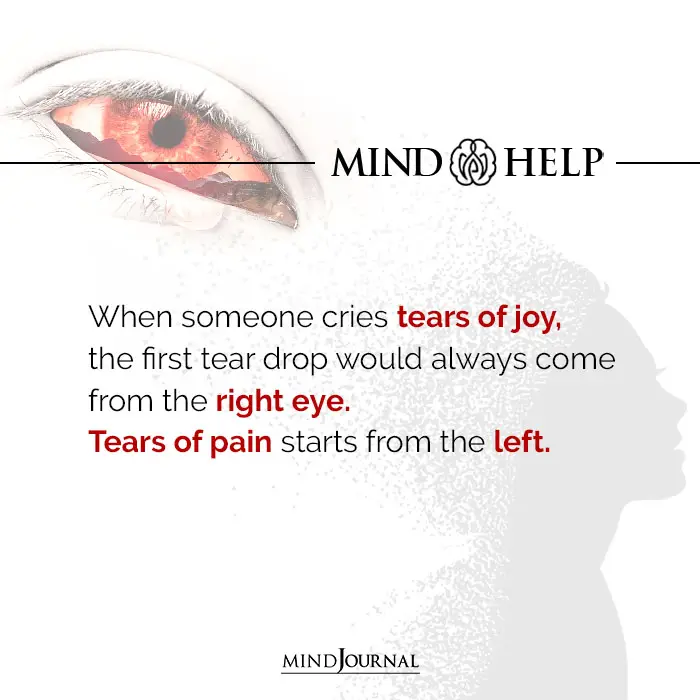Have you ever found yourself crying tears of joy? It might seem like an oxymoron, but happy crying is a real thing, and it’s more common than you might think. Let’s explore the secret of happy tears, why do we cry when we are happy and why they’re worth celebrating.
When we think of crying, we often associate it with sadness, loss, or pain. But have you cried when you are happy? Happy crying is a sign of intense emotions and can be a powerful expression of joy and happiness. So, why do we cry when we are happy, and what are the benefits of shedding tears of joy?
What is happy crying?
Happy crying, also known as tears of joy or happy tears, is an emotional response to positive experiences or events. It is a natural physiological reaction that occurs when we feel extreme happiness, pride, or gratitude.
Happy crying can manifest in different ways, from a single tear rolling down the cheek to full-blown sobbing. It is often accompanied by a feeling of warmth in the chest, a lump in the throat, or a sense of relief.
Happy tears or crying when happy are a normal and natural way for our body to express intense happiness and joy that is overwhelming. When we feel so happy that our hearts are filled with love, gratitude and wonder, happy tears give our bodies the physical release they need.
Related: The Healing Power of Tears
Why do we cry when we are happy?

The science behind happy crying is not fully understood, but there are several theories that try to explain this phenomenon. One of the most accepted theories is that tears are a way for our body to release intense emotions that we cannot express in words.
When we experience overwhelming feelings of joy or happiness, our brain triggers the release of neurotransmitters, such as dopamine, oxytocin, and endorphins, which can lead to tears.
Another theory suggests that happy crying is a way for our body to regulate emotions and restore balance. When we feel extreme emotions, our body goes into a state of arousal, which can be overwhelming and exhausting.
Tears help to reduce the level of arousal and bring us back to a more stable emotional state.
Still wondering why do we cry when we are happy? Here are a few reasons why we cry when we are happy:
1. It’s a release of overwhelming emotions
Intense happiness can fill us with so many positive emotions like joy, love, gratitude and wonder that our bodies need a physical release. Crying provides that outlet.
2. It’s a reflex response
When we experience extreme joy, our tear glands produce more tears as a reflex response. The excess production of tears causes them to spill out of our eyes.
3. It reduces stress chemicals
Crying when happy helps reduce stress hormones like adrenaline that rise when we are overjoyed. The release of tears through crying balances these chemical levels in our body.
4. It releases “feel good” hormones
Experiencing intense joy causes hormones like serotonin and oxytocin to be released in our brains. Crying then helps release some of these “feel good” chemicals through our tears.
5. It releases excess energy
Extreme happiness fills our bodies with a rush of positive energy. Crying acts as a physical outlet for releasing some of this built up energy.
6. It shows we’re fully experiencing the moment
Happy tears indicate that our hearts and souls are profoundly touched by the joy of a special moment. They show we’re fully embracing the happiness we feel.
Happy crying or happy tears provide a physiological release that our bodies need when joy and delight become overwhelming. The tears are a beautiful expression of the depth of happiness we feel in those perfect moments of life.
Related: Why Do You Cry Easily: Even Without Any Reason
Examples of crying when happy
Experiencing happiness to a great degree often results in happy crying. Some of the common instances that can produce happy tears are:
1. Witnessing a special moment in the life of a loved one like a wedding, birth of a child or graduation. The love, joy and wonder we feel in that moment of happiness brings tears of joy.
2. Witnessing moments of kindness, love and selflessness. Seeing acts of generosity and compassion towards others can bring us to tears of joy for the goodness in humanity.
3. Experiencing elevated spiritual feelings. Intense gratitude, connectedness or devotion towards God can also cause tears of happiness.
4. Accomplishing a long desired goal. Achieving success in anything we have worked hard for and wanted badly can fill our heart with so much joy that we cry happy tears.
5. Being reunited with someone we dearly love after a long time apart. The overwhelming feelings of love and fulfillment on seeing our loved ones again after a long separation often result in happy crying and happy tears.
So while happy tears may seem confusing and paradoxical at first glance, they serve as a physical release that our body needs when happiness becomes too much to contain within.

The science behind happy crying
Scientists have found several physiological reasons for why we cry when we are happy. Happy crying, also called emotional tears of joy, have a distinct chemical composition compared to tears due to sadness or pain.
1. Our tear glands produce more tears when we are emotionally overwhelmed
The lacrimal glands present above our eyes start producing more tears as a reflex response to intense joy. This excess production of tears results in tears overflowing our eyes when we experience immense happiness.
2. Release of ‘feel good’ hormones
When we experience joy, our brain releases hormones like oxytocin and serotonin that make us feel good.
However, in times of extremely intense joy, our tear glands start secreting these ‘feel good’ hormones along with tears, which gives our body a chemical release.
3. Reduction of stress chemicals
Crying when happy also helps reduce the levels of stress chemicals like adrenaline and noradrenaline that rise sharply during times of extreme joy and excitement. The release of tears helps balance these hormone levels in our body again.
4. Physical release of excess energy
Overwhelming happiness rushes our body with a lot of positive energy. Happy tears act as an outlet for the physical release of the energy built up within us due to intense joy and delight.
So when happy tears flow down your cheeks at a moment of joy, smile and let the happy crying happen. It shows that your heart and soul are rejoicing in the magic of that perfect moment.
Happy tears are nothing to feel embarrassed about, rather they are a beautiful expression of the fullness of happiness within.
Related: How to Stop Being an Emotionally Repressed Person: Crying Therapy
Benefits of happy crying
While crying is often associated with negative emotions, crying when happy can have positive effects on our mental and physical health. Here are some of the benefits of happy crying:
1. Relieves stress and tension
Crying, in general, can help to reduce stress and tension by releasing built-up emotions and calming the nervous system. Happy crying can have a similar effect, allowing us to release pent-up feelings of joy and happiness and feel more relaxed and at ease.
2. Improves mood
Happy crying can improve our mood by boosting the levels of feel-good hormones in our body, such as endorphins and oxytocin. These hormones can help to reduce feelings of anxiety, depression, and loneliness and promote a sense of well-being.
3. Strengthens social bonds
Happy crying can also strengthen social bonds by promoting feelings of empathy, connection, and gratitude.
When we witness someone else’s joy or success, we might feel moved to tears, which can create a sense of shared experience and deepen our relationships.
4. Enhances emotional awareness
Happy crying can enhance our emotional awareness by helping us to recognize and express our feelings more effectively. By allowing ourselves to cry when we are happy, we can become more attuned to our emotions and develop a greater sense of emotional intelligence.
How to embrace happy crying
If you are someone who tends to suppress your emotions, including feelings of happiness and joy, it can be challenging to embrace happy crying. Here are some tips that can help you to feel more comfortable with shedding tears of joy:
1. Practice mindfulness
Mindfulness can help you to become more aware of your emotions and sensations and create a safe space for experiencing them. When you feel happy or joyful, try to observe the feeling without judgment and allow yourself to express it in a way that feels natural.
2. Create a supportive environment
Surround yourself with people who accept and validate your emotions, including happy crying. If you feel comfortable sharing your feelings with others, it can help to deepen your connections and create a sense of belonging.
3. Don’t judge yourself
Remember that crying when you are happy is a natural and healthy response to intense emotions. Don’t judge yourself for shedding tears of joy or feel embarrassed about it. Instead, embrace your emotions and allow yourself to experience them fully.
Related: 8 Science-Backed Benefits of Crying

Takeaway
Happy crying is a beautiful and powerful expression of joy and happiness that can bring us closer to ourselves and others. It is a reminder that emotions, both positive and negative, are an essential part of the human experience and should be embraced and celebrated.
So, the next time you feel overwhelmed with feelings of happiness, don’t be afraid to shed some happy tears. It might just be the most liberating and life-affirming thing you can do.
Frequently Asked Questions (FAQs):
What is happy cry called?
Happy crying is another term for tears of joy or simply, happy tears.
Why am I happy crying?
You might be happy crying due to intense emotions of joy, pride, or gratitude that cannot be expressed in words, leading to the release of tears.
Is happy crying healthy?
Yes, happy crying can have positive effects on our mental and physical health by reducing stress, improving mood, and strengthening social bonds.









Leave a Reply
You must be logged in to post a comment.